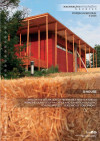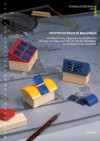Suchergebnisse
Biobased Plastics Scenario 2050 - plastics made from renewable resources
A “2050 scenario - plastics made from renewable resources (bio-based plastics)” has been developed. The hypothetical target of this scenario is for bio-based plastics to have a 100 % market share of product manufacturing in the EU. The scenario provides the basis for further national RTI activities and for recommendations for regulation.
New Communal Centre Ludesch

Community centre with multi-functional usage (cultural events, library, post office, bakery, grocery, daycare, private apartments, meeting point of the generations); role model for consistent implementation of ecological criteria in public tendering; plausible evidence of cost efficiency
New aluminium - sun collector

The development of a new aluminium - sun collector, where the working- fluid completely run through the absorber- area, to reach a higher efficiency.
Energy park Micheldorf-Hirt
Co-operative merging of the energy supply for the Region of Micheldorf within an operating scheme and supply of energy produced through renewable resources. Sustainable, autarkic, economic energy park. Energy supply by renewable resources for the building of the energy autarkic region Micheldorf-Hirt
PHOTOVOLTAIC WATER Solution
Passive House refurbishment facade with integrated photovoltaic modules for direct, current-based warm water preheating. The GIWOG, an energy-conscious and environmentally and socially oriented client, intends to undertake an energy-related modernisation project, which will further optimise energy consumption to be more efficient at an apartment complex in Graz, main street 302-306. The goal is to lower the energy consumption for heating and hot water from the current level of approximately 135 kWh /m²a to approximately 8 kWh /m²a. The planned measures should correspond with an overall energy consumption reduction of approx. 94 %.
S-House

Innovative Utilisation of Renewable Raw Materials as in the Example of an Office and Exhibition Building for the Project "Building of Tomorrow"
Forschungsforum
3/2005
Herausgeber: BMVIT
Englisch, 6 Seiten
Downloads zur Publikation
Solar Assisted Heating Networks
An investigation of the economic and ecological usefulness of coupling two CO2 neutral energy sources; solar installations for multi-family houses, producing standardised systems concepts and planning guidelines.
Carless Tourism In Austria

The valleybus project Lungau, Murau, Nockgebiet - an innovative pilot scheme
Forschungsforum
3/1995
Herausgeber: BMVIT
Englisch, 6 Seiten
REVITALISING with S.A.M. - Synergy Activation Modules

Case study for the development of modules that allow for the revitalisation of existing structures without interruption of utilization (two studies, one realisation).
Photovoltaics In Buildings

International research cooperation within the framework of the IEA program "SOLAR HEATING& COOLING"
Forschungsforum
1/1997
Herausgeber: BMVIT
Englisch, 6 Seiten
Downloads zur Publikation
3rd Post Combustion Capture Conference
8. - 11. September 2015
Saskatchewan, CA
The conference will focus on current Post Combustion Capture (PCC) issues, developments and future trends in CO2 post combustion capture technology.
Solar cooling machine with a cooling power of 2 kW

Development and building of a prototype of a coolingmachine with a cooling power of 2 kW, tests and optimizing on a test facility, connection to a solar unit and utilization for air conditioning.
Webinar: Biofuels for the marine sector - new opportunities and new challenges
8. May 2018
Online
The seminar will give an overview of the marine sector; its fuel and engine types used, the fuel supply infrastructure and the regulations on fuel specifications and CO2 emissions. The feasibility of current biofuels including their properties and supply will be discussed and opportunities for new types of biofuel will be presented.
e-retrofit kit - tool kit for passive house retrofit
Development of an internet-based tool for passive house retrofit für - target group social housing companies. Actualization of tool after test and evaluation in case-studies. dissemination activities in austria.
Virtual Biogas - Biogas-Upgrading and Grid-Injection
Production of natural gas substitute from biogas and grid-injection to the public natural gas grid on an industrial scale using the two-staged membrane separation process gaspermeation. Design and erection of the upgrading plant at the biogas plant Bruck/Leitha as well as monitoring and optimisation of the operational characteristics.
Saving energy with "single-family house contracting"
Saving energy with "single-family house contracting": developing of standardized modules for energy saving measures, evaluation methods for proving the quality of the measures, model contracts and marketing-strategies.
Building and modernising with "Building of Tomorrow"
The project BauModern turned to non-profit and commercial housing developers and real estate managements. In close co-operation with the federations of the housing and real estate economy has been achieved that builders are informed about market-suited innovative technologies and concepts and use these strengthened for their projects both in the new building and in the refurbishment.
Building of Tomorrow for the construction industry
Dissemination of results of the research initiative "Building of tomorrow" for two specific target groups - master builder and installer - implementation in further vocational training concepts
e80^3-Buildings - Sub project 4: Demonstration object
Alongside the realisation of the plus energy building in Kapfenberg, a demonstration project is scheduled to be created that accomplishes an economically viable and technically innovative solution for the future.
